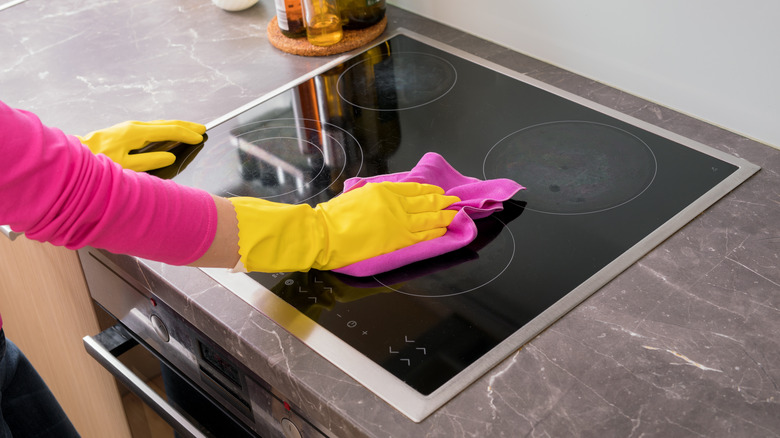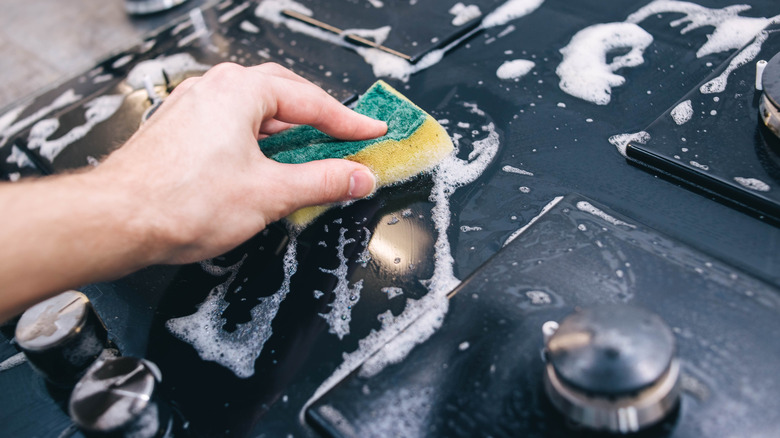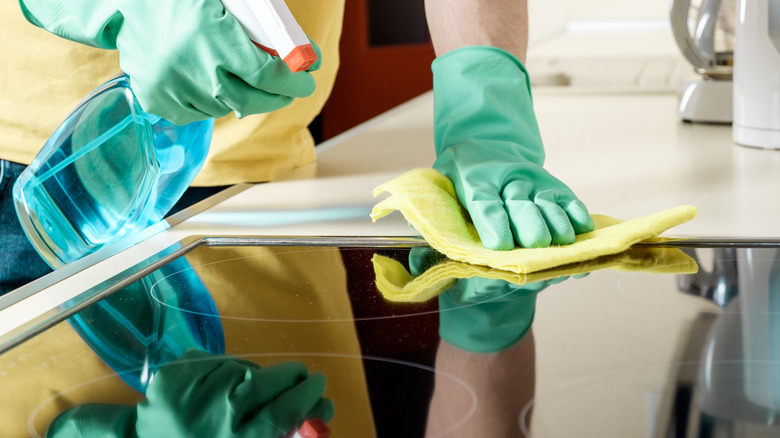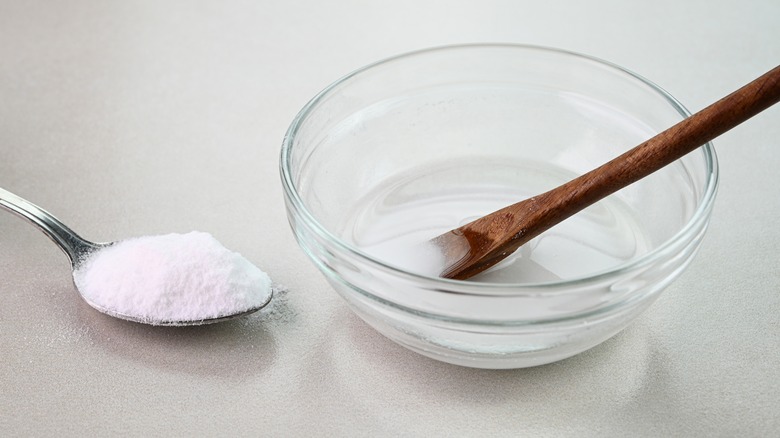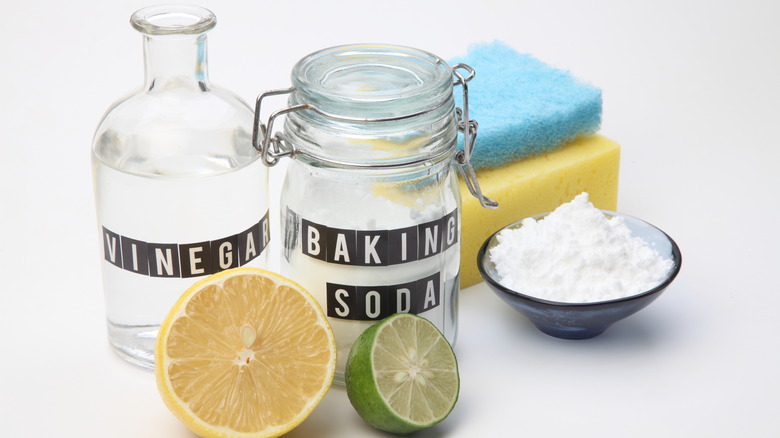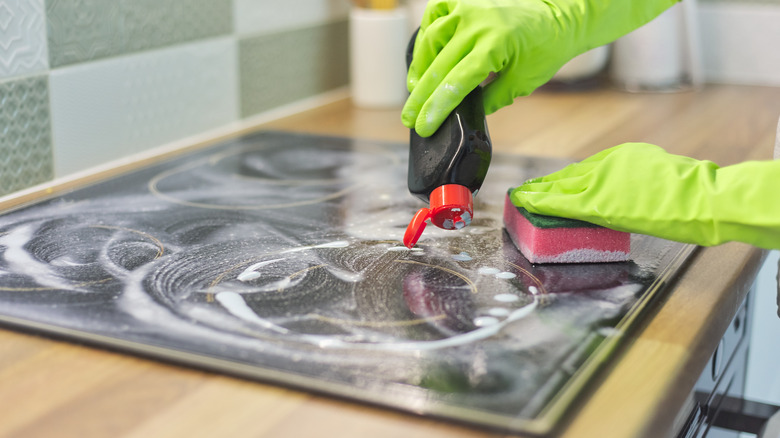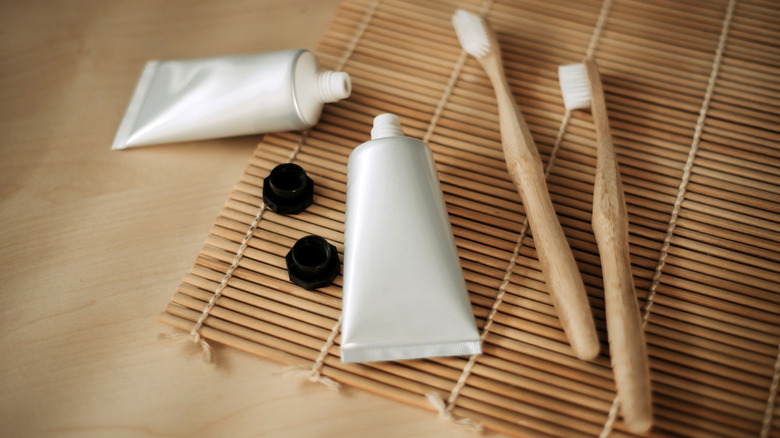How To Clean A Glass-Top Stove For A Scuff-Free Surface
Glass-top stoves can do all the heavy-duty cooking that gas or electric burners can but with the additional bonus of being sleek, snazzy, and a whole lot easier to clean without all those grates and coils to weave through. However, glass-top stoves do have their flaws. Unlike the harsh cleaning that some stoves can withstand, the blend of glass and ceramic that glass-top stoves are made from is awfully easy to scratch. This is why cleaning dirty glass-top stoves requires a gentler approach.
While razor blades do an excellent job of cleaning glass-top stoves, using them incorrectly like using the corners instead of the blade can easily leave scratches that will be much harder to get off than any grease or grime. Even then, glass-top stoves are better off without tough cleaning tools like scrub brushes and steel wool or scouring pads that scrape the appliance. Using the wrong cleaner could scuff the stove too, as anything too abrasive can potentially leave scratches on the glass. Instead, it's best to use softer tools and powerful but gentle cleaners when cleaning glass-top stoves. No matter what you do, stay far away from harsh chemicals that could cause permanent damage.
Scrub it with dish soap
Sometimes, the most obvious option is also the most easiest and effective solution. If you're looking to clean everyday spills and stains from your glass-top stove, a simple dish soap may suffice. Dish soap is also convenient to use when you want to give your stove a quick wipe down as soon as you finish cooking to prevent a buildup of grime over time.
Once you're done cooking, allow your stove to cool down as cleaning it while it's still hot can leave streaks all over its shiny surface. First, dry dust the stove to rid it of crumbs or debris. Next, whisk a few drops of dish soap into a vessel filled with warm water and dip a sponge or a soft cloth into it before gently scrubbing the stove with it. Wipe the mucky soap off with another clean damp cloth and dry the stove.
If stains prove to be too stubborn for diluted soapy water, you could always pour the dish soap directly onto your sponge or cloth for a more concentrated solution. If it's the first time you're using dish soap to clean your glass-top stove, it's best to test the soap on a small area first just to be sure that it doesn't damage the appliance.
Use a white vinegar water solution
If you're ever in doubt about how to clean something, always remember that it's probably nothing that a dash of white vinegar can't fix. The credit for vinegar's wonderful cleaning abilities goes to its acidic nature which is powerful enough to cut through grease, grime, stains, and even mineral deposits. At the same time, vinegar isn't so acidic that it damages anything in the cleaning process. Vinegar also has deodorizing properties. If your stove is starting to smell like a foul cocktail of eggs, fish, and bacon from weeks of cooking, the vinegar will get rid of that too.
To use white vinegar to clean your glass-top stoves, dilute it with equal parts of water first. Spray the white vinegar water solution all over the stove, rub it down with a gentle scrub, and then use another damp rag to wipe off the vinegary liquid from the stove before drying it with a microfibre cloth. Before you get down to scrubbing the stove, you may want to consider giving the white vinegar some time to loosen all the gunk. In general, white vinegar takes up to half an hour to set in and work its way through greasy stains. For that reason, you may want to give the stove time to soak in the acidic solution before you get to scrubbing it.
Make a baking soda paste
Baking soda is another essential to have in your arsenal, not only for its leavening properties in the oven but for baking soda's ability to clean everything else as well. Cleaning a delicate glass-top stove requires a non-abrasive cleaner but you still want something that is at least a little gritty to break down that stubborn grime clinging onto it. In such cases, baking soda is a godsend. It is only mildly abrasive, which means it can remove stains, spills, and stuck-on foods without leaving any scratches in its wake.
There are several ways to use baking soda on a glass-top stove. You could mix baking soda with water using a 3:1 ratio, smear the thick paste all over the stove, and cover it with a warm damp cloth for 30 minutes before wiping it off. You could also mix the baking soda with other liquids if your stove requires more heavy-duty cleaning. Baking soda and vinegar are best friends both in baking and cleaning, so it only makes sense to use them together on your glass stove too. Spray white vinegar on the stove, sprinkle a bit of baking soda on top, and watch the bubbling fizz loosen even the nastiest of stains. You can also spike your dish soap with a pinch of baking soda if you want an everyday cleaner that is on the more abrasive side.
Throw a lemon into the mix
White vinegar and baking soda aside, lemon or citric acid is another pantry staple that doubles as a powerful cleaning agent. Lemon has antibacterial and deodorizing properties and its acidic nature makes it possible for the fruit to tackle food stains, too. When combined with both baking soda and white vinegar, lemon can practically make glass stoves sparkle as if they were brand new.
Slice your lemon in half and spray the juice of one half all over the stove, using the other half as a gentle scrubber to spot clean dirty areas. Dust baking soda on top and cover the stove with a damp cloth soaked in hot water for half an hour (or longer for particularly stubborn messes). Wipe the paste away and then clean the stove with white vinegar once more before drying it. If white vinegar is not an option, you can always use just baking soda and lemon. They make a formidable duo to tackle dirty glass-top stoves.
Commercial cleaners can be effective too
There is no denying that dish soap alone can take care of most kitchen grease and what the detergent can't do, DIY kitchen cleaners can. Other times, however, it can be more convenient to simply use a commercial cleaner. You won't have to worry about damaging your glass stove or go through the trouble of whisking together your own cleaning potion. In addition, commercial cleaners can save you from using some elbow grease.
Bar Keepers Friend, for example, has mildly abrasive liquids designed to clean stoves made from glass and ceramic without marking them with scratches. There are grease-cutting sprays, magic erasers, specialty pastes, and heavy-duty cleaners tailored to buff and polish glass stoves without damaging them. It's also best to check the care instructions on the manual provided by the manufacturer as some glass-top stoves may require very specific cleaners to keep them from scuffing.
Cover stains with toothpaste
Toothpaste ... to clean glass-top stoves? Who would have thought of that? Just like baking soda, toothpaste is abrasive enough to clean glass stoves (and your teeth) without damaging them whatsoever (just like your tooth enamel). Scoop out some toothpaste onto a brush and gently scrub it over food stains and burnt patches on the stove. Leave the toothpaste on for 15 minutes and then wipe it off with a soft cloth. While toothpastes that already contain baking soda in them are perfect fits for the task, even whitening toothpastes will do a fine job as they are designed to get rid of stains and make things sparkle. With all these tips, you're sure to have one of the cleanest, if not the cleanest, glass-top stoves around.

